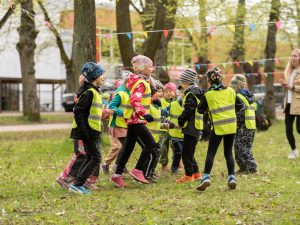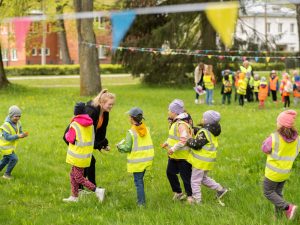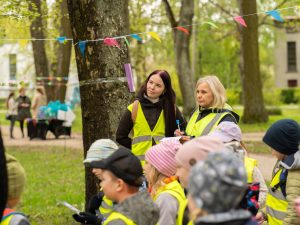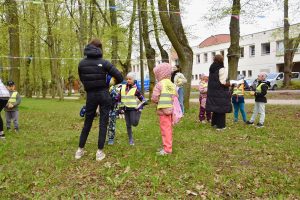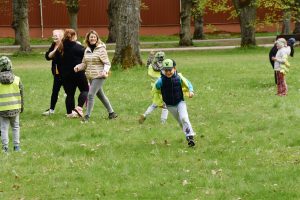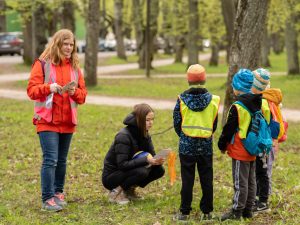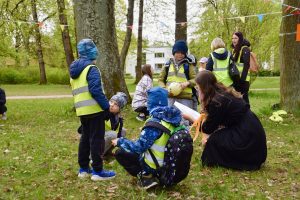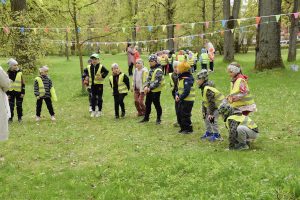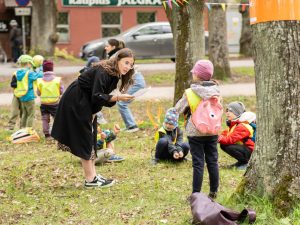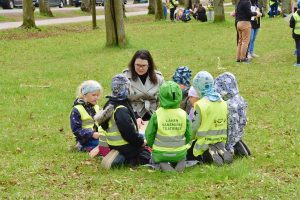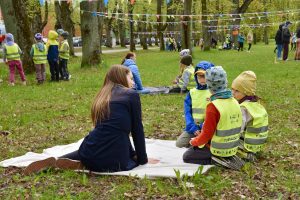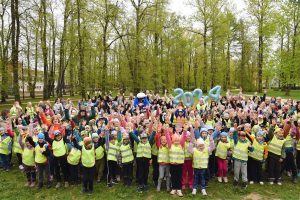Estonia’s First Internet Safety Drill for Preschoolers: DigiÄKK
Author: Annaliisa Post
On May 13th, Tähtvere Park was filled with joyful children and excited students for the first-ever digital security flash drill aimed at preschoolers, called DigiÄKK.
Even before the event’s official start, Tähtvere Park was bustling: around 200 kindergarteners sang along to children’s songs, and groups spontaneously started playing circle games. They were joined by event hosts dressed as cats and the University of Tartu’s mascot, Tiksu. Although Tiksu was unfamiliar to most children, children were curious about him and wanted to dance and take pictures with Tiksu.
After the cats gave their welcome speeches and danced briefly with the children, it was time to start learning about digital security. Ten groups from different kindergartens in Tartu gathered to play ten games designed to teach them how to behave safely on the internet. The games were facilitated by future teachers and youth workers taking the “Playful Development of Media Competence” course this spring semester at the University of Tartu.
Learning about digital topics without digital tools
Although the focus of the event was on the internet and screens, there were no screens present. Learning took place through age-appropriate games that encouraged discussion and movement. For instance, children had to decide whether a sentence read by the game facilitator was related to harmful or beneficial online content and indicate their answer with an agreed-upon gesture. Additionally, preschoolers learned about different types of advertisements, the work of a web police officer, cyberbullying, and the risks of sharing personal information. The children’s laughter, happy faces, and curious eyes in the park indicated that the participants enjoyed the event and that new knowledge was cleverly integrated into the games.
The necessity and interest in such an event were evident from the registration for the rehearsal day and DigiÄKK – both filled up within an hour and a half. During the rehearsal day, students tested their invented games for the first time at Ristikheina Kindergarten to refine them if needed. According to the lecturers responsible, Maria Murumaa-Mengel and Inger Klesment, rehearsal day is crucial for organizing such an event.
“Here we have students who are just starting their studies and some who may not have had much interaction with young children,” explained Murumaa-Mengel. “They don’t necessarily know what children know or don’t know, how to talk to them, and what their media world is like. All of this can be learned through ‘problem-based’ learning – if you see that a child participating in the game doesn’t understand you, you must adjust the activity.”
Digital topics are making a strong impact on children’s lives
In addition to students and preschoolers, the event excited teachers. They viewed the students as future colleagues and were a bit envious that they didn’t have such opportunities during their studies. The event also allowed teachers to expand their repertoire of games and knowledge. Airi Koorberg, a Tartu Karlova Kindergarten teacher who attended the event with the Tähepärlite group, mentioned that children are increasingly exposed to digital devices. “They all have phones, they have tablets. Some even have two phones – when one is charging, and they use the other. When they go home from kindergarten, they dive into these devices,” described Koorberg. She suggested that parents should discuss these topics with their children when providing digital devices and monitor what their children watch on YouTube, for instance. Koorberg added that children play games on digital devices that are not age-appropriate and don’t realize the negative impact. She gave an example of children experiencing nightmares due to digital device usage. Therefore, she emphasized that such events are very important.
Kristiina Ess, a teacher with long-term experience who attended the event with the Fairies group from Tartu Hellik Kindergarten, agreed that the internet and digital devices interest children. Reviewing key concepts before the event, it became clear that children’s digital security knowledge varied greatly. Ess mentioned that their group had previously discussed digital topics in the context of playing computer games and sharing usernames and passwords. “Such events are important because the digital age is advancing rapidly, and it’s good for children to be aware of these topics, especially cyberbullying and other issues they will face in school,” said Ess.
The first DigiÄKK certainly won’t be the last
According to lecturers Murumaa-Mengel and Klesment, the event succeeded even better than they had imagined. The course “Playful Development of Media Competence” is planned for three years, and the lecturers intend to organize DigiÄKK in the coming years. “I’m already mentally prepared to buy a new balloon with the number five next year,” said Klesment, referring to the number-shaped balloons at the registration table representing the current year (2024).
Although everyone agrees that such an event is necessary and the first DigiÄKK was very successful, the lecturers admit that conducting such a course and event is not easy. “Such a course is much harder to execute than a course with 16 lectures, hoping that this talk will magically transform into practical knowledge,” said Murumaa-Mengel. For the lecturers, it was also quite a challenge to relinquish control and trust the students, as losing one link could break the whole system. After the event, however, the lecturers agreed that they are proud of the students, and Klesment and Murumaa-Mengel are eagerly looking forward to the next DigiÄKK.
The event was supported by the University of Tartu, Lasteabi.ee, Tartu2024, and Autospirit, and funded by the Baltic Engagement Centre for Combating Information Disorders (BECID) and the University of Tartu’s Future Skills Development Course Fund.
WP 4; task 4.1.
- Processed with Lensa with PT17 filter
- Processed with Lensa with PT17 filter
- Processed with Lensa with PT17 filter
- Processed with Lensa with PT17 filter
- Processed with Lensa with PT17 filter
- Processed with Lensa with PT17 filter
- Processed with Lensa with PT17 filter


